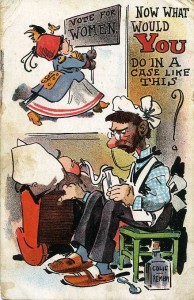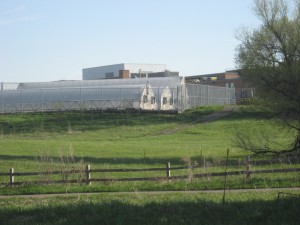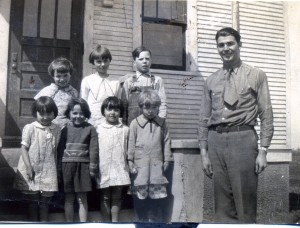#369 – Dick Bernard: Mother's Day 2011
UPDATE June 7, 2011. Here’s the flower we bought at the Work House a month ago, May 7, 2011.

UPDATE August 5, 2011. Here’s the same plant, now dubbed a ‘monster plant’ by our neighbors, on August 5. It’s the best plant we’ve ever had!
To all Mom’s out there, a great day.
I know at least one young Mom for whom this day has recent and tragic memories, and to her and all of the many others in this world who have lost a son or daughter long before their normal time, my condolences. Being Mom is not always easy.
Defining “Mom” these days is a bit harder than 100 years ago, as this 1910 postcard found at my grandparents farm shows.

Women’s suffrage was still 10 years in the future.
Friday I was at my bi-monthly ‘blood-letting’, donating blood at the Memorial Blood Center branch here in Woodbury.
The Nurse – herself a Mom – and I were chatting. She mentioned that she planned to go over to the Ramsey County Work House to get her Mother’s Day flowers.
Flowers for sale at the Work House? I’d never heard of such a thing, but the idea was intriguing so we went over there Saturday morning. It was worth the trip.
Every society has its guys (and gals) who’ve taken the wrong turn on the road of life, and ours is no different. The inmates have Moms, and Dads, too, and while they’re doing their time, particularly if they’re not on work release, there is work. Why not grow flowers?
At this work facility, the decision was made to have a greenhouse in which they raise annual plants, and sell them on weekends beginning on Mother’s Day weekends. The flowers certainly don’t mind who plants and cares for them, and the products we purchased and delivered matched those we normally buy at the commercial greenhouse.
I’m sure there were guards somewhere yesterday, but they were unobtrusive. There were volunteers too (the lady who met us said, with a smile, “be careful, last year I came here as a customer, and here I am volunteering!”), and there were inmates helping carry and deliver the products to our cars. Our helper were a couple of younger adult inmates, very polite. I have no idea what got them their time in the slammer but that didn’t matter. They were polite and helpful.
As I say, these inmates have Moms too.
One way or another every one of us have or had a Mom, and a Dad, who hopefully at least tried to raise us to the best of their ability. Having assumed the role of a “Mr. Mom” for quite a number of years, I sort of know the trade, the perils, the pitfalls. It’s not easy being Mom – or Dad – for that matter.
But this is the day for Mom’s, whether living or dead.
Remember them, perhaps especially the Mom’s of those inmates at the Work House and other such places.
And if you haven’t done so, or done so recently, consider taking up the ‘blood-letting’ routine at your local blood bank. I evaded that duty for years but it’s now a good habit.
Have a great day. Here, thanks to Lucy’s Mom (and my daughter, Lauri), is a little gift for the day to everyone reading (click on the photo to enlarge).
(I’m tempted to say, “Lucy in the sky with diamonds“. Great Thanks to the Beatle’s, Yellow Submarine and You Tube. Son Tom and I went to this movie sometime in 1968 at the then-Suburban World Theatre in uptown Minneapolis.)








